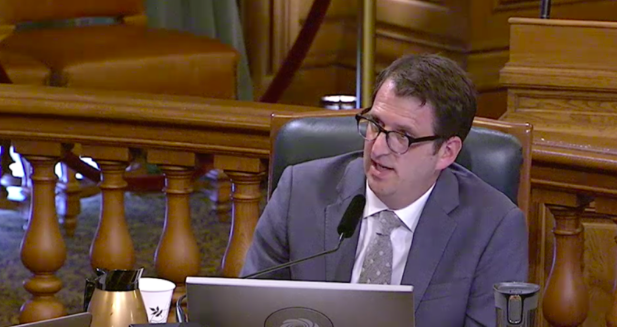The Board of Supes, by a veto-proof majority, approved a measure today to allocate $64 million to fund social housing.
Only Sups. Catherine Stefani, Myrna Melgar, and Ahsha Safai dissented.
The vote does more than set aside money to take vulnerable properties off the speculative market. It sends a clear message to the Mayor’s Office that the supervisors are close to unanimous in their position that money from Proposition I should be allocated to housing.

The measure charges higher taxes on properties sold for more than $10 million, and supporters promised that the money—now more than $100 million a year—would be spent on rent relief and social housing.
But Mayor London Breed so far has refused to put that money into housing, diverting it instead to other General Fund purposes.
Sup. Rafael Mandelman, considered a swing vote, made the point: “We have to agree as a government to us this money in the way that was the intent of the voters.”
The Council of Community Housing Organizations noted:
This action by our City legislators was not simply about an installment of $64 million to invest in affordable housing, but about listening to the voters who passed the Proposition I ballot measure overwhelmingly in November 2020 with the intention of funding a wide range of social housing programs: from preservation of small apartment buildings facing Ellis Act evictions to large residential hotels deteriorating in the hands of private owners, from land trusts to homeownership cooperatives. This will result in real housing for real everyday people – from seniors and people with disabilities whose hard work built this city, to hotel and service workers, to the jobs we used to think of as middle-class, the educators, healthcare workers and electricians who can no longer afford a home in San Francisco’s inflated real estate market.
The vote sets up a potential confrontation with the Mayor’s Office just weeks before the mid-year budget negotiations. Breed tried hard to block this from passing.
But there’s hope that both branches of government can work together on the problem: Just an hour before the vote, Breed put out a press release announcing a plan to reform and improve the small-sites acquisition program.
It’s clear that this legislation has forced the Mayor’s Office to the table. Even Safai, who opposed it, noted that Sup. Dean Preston’s advocacy has moved the conversation forward.
Among the changes Breed is offering are elements that affordable housing groups have been demanding for years, including changes in the eligible units prices (in some parts of the city, the subsidy is too low to make purchases possible), easing of some regulations that delay purchases, and more support for the nonprofits that end up buying and having to manage the properties.
One of the arguments that the mayor and her allies have made against the new funding is that the program is such a mess there’s no reason to put more money into it until it’s fixed. “We are going to promise people a program that isn’t ready to work,” Sup. Myrna Melgar, who voted against the measure, said.
She said she didn’t want to “get into a protracted war with the administration.”
She said she would rather “work with the administration” to make sure changes are in place before putting up the cash that the program so desperately needs to function.
But it appears that those changes are already underway—and by the time the money actually gets to the nonprofits who are prepared to buy buildings, substantial reforms should have been completed.
Mandelman, whose vote was necessary to block a mayoral veto, said that he doesn’t love the idea of “putting $64 million to a program that we know is broken. … I would have hoped the mayor and the board would come together on the use of Prop. I dollars.”
But that hasn’t happened yet, he said, and “the voters wanted this money to be spent for housing.”
Sup. Hillary Ronen said that the issues with the small-sites program “are not rocket-science problems. We are fixing it.” Oh, and the program, despite its problems, has funded the purchase of 47 buildings with 368 units that are now forever off the speculative market.
The mayor could, in theory, continue to simply defy the board and not spend the money (as she has done in the past). But that’s going to get harder as budget negotiations get underway and the board has made is very clear that funding the purchase of buildings is a high priority.
“This is not our money,” Sup. Connie Chan said. “It’s the taxpayers’ money, and this is how they want it spent.”






